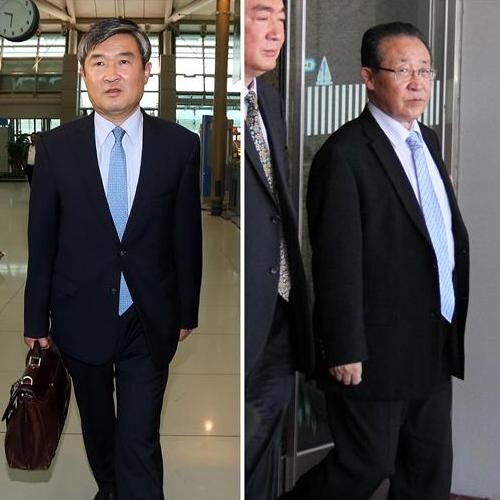hankyoreh
Links to other country sites 다른 나라 사이트 링크
N. Korea makes another call for resuming dialogue

By Kang Tae-ho, senior staff writer
North Korea is signaling to Seoul that it wants to resume dialogue. Meanwhile, the US and China are contacting other countries to get the six-party talks on the North Korean nuclear issue moving again.
Commenting on the recent cancellation of planned inter-Korean talks, North Korean Workers’ Party office newspaper Rodong Sinmun made a call on June 18 for resuming dialogue.
“Rather than obstructing the development of North-South relations by focusing on pointless things, the authorities in South Choson [Korea] need to be following the path of reconciliation and reunification,” the piece said.
In an editorial titled “Going Forward with the Banner of the People’s Unity Held High,” the newspaper proclaimed, “The failure of this long-awaited opportunity for dialogue by North and South Korean authorities is connected to the South Choson authorities’ failure to speak for the [Korean] people.”
Jang Jae-on, chairman of the North Korean religious group Korean Council of Religionists, also reportedly expressed his dismay over the breakdown while speaking in Beijing on June 13 to figures from the Korean Conference on Religion and Peace, a group representing South Korea’s seven main religions. Pyon Jin-hung, the conference’s director, quoted Jang as expressing “hope for resumption of inter-Korean dialogue.”
Meanwhile active diplomatic efforts are under way to arrange talks between the North Korean and US governments and a resumption of the six-party talks.
Speaking at a June 17 briefing after an announcement of the White House’s position the day before, US State Department spokesperson Jen Psaki suggested that Pyongyang’s latest offer for high-level talks was nothing new.
In response to a question on whether she viewed the proposal as different from past ones, Psaki said there had been “dozens if not hundreds [of offers]…depending on how far you go back.”
But when asked whether the US was still open to bilateral talks as part of the six-party talks process, Psaki answered, “Correct. But the key piece here is that they need to take credible steps to move towards concrete denuclearization.”
Her remarks suggest that the ability to bridge the difference between Pyongyang’s demand for unconditional talks and Washington’s demand for “credible steps” will determine how the situation proceeds.
Psaki also noted that the South Korean and Japanese representatives for the six-party talks were meeting later in the week with Glyn Davies, the State Department’s special representative on North Korea policy.
“This will, of course, be a big topic of conversation,” she said, referring to the call for “credible steps.”
Cho Tae-yong, South Korea’s special representative for Korean Peninsula peace and security affairs and chief representative at the six-party talks, left the country on June 19 for a trilateral meeting with the US and Japan, with plans to visit China on June 21. Meanwhile, Kim Kye-kwan, North Korea’s first vice foreign minister, is scheduled to have strategic dialogue on June 19 with Chinese vice minister of foreign affairs Zhang Yesui.
The moves had some observers speculating that Washington and Beijing may be spearheading preliminary discussions toward a resumption of the six-party talks.
Please direct questions or comments to [english@hani.co.kr]

Editorial・opinion
![[Column] Has Korea, too, crossed the Rubicon on China? [Column] Has Korea, too, crossed the Rubicon on China?](https://flexible.img.hani.co.kr/flexible/normal/500/300/imgdb/original/2024/0419/9317135153409185.jpg) [Column] Has Korea, too, crossed the Rubicon on China?
[Column] Has Korea, too, crossed the Rubicon on China?![[Correspondent’s column] In Japan’s alliance with US, echoes of its past alliances with UK [Correspondent’s column] In Japan’s alliance with US, echoes of its past alliances with UK](https://flexible.img.hani.co.kr/flexible/normal/500/300/imgdb/original/2024/0419/2317135166563519.jpg) [Correspondent’s column] In Japan’s alliance with US, echoes of its past alliances with UK
[Correspondent’s column] In Japan’s alliance with US, echoes of its past alliances with UK- [Editorial] Does Yoon think the Korean public is wrong?
- [Editorial] As it bolsters its alliance with US, Japan must be accountable for past
- [Guest essay] Amending the Constitution is Yoon’s key to leaving office in public’s good graces
- [Editorial] 10 years on, lessons of Sewol tragedy must never be forgotten
- [Column] A death blow to Korea’s prosecutor politics
- [Correspondent’s column] The US and the end of Japanese pacifism
- [Guest essay] How Korea turned its trainee doctors into monsters
- [Guest essay] As someone who helped forge Seoul-Moscow ties, their status today troubles me
Most viewed articles
- 1[Column] The clock is ticking for Korea’s first lady
- 2After 2 months of delayed, denied medical care, Koreans worry worst may be yet to come
- 3[Column] Has Korea, too, crossed the Rubicon on China?
- 4Samsung barricades office as unionized workers strike for better conditions
- 5All eyes on Xiaomi after it pulls off EV that Apple couldn’t
- 6[Correspondent’s column] In Japan’s alliance with US, echoes of its past alliances with UK
- 7US overtakes China as Korea’s top export market, prompting trade sanction jitters
- 8Hong Se-hwa, voice for tolerance whose memoir of exile touched a chord, dies at 76
- 9[Photo] Smile ambassador, you’re on camera
- 10[Editorial] When the choice is kids or career, Korea will never overcome birth rate woes